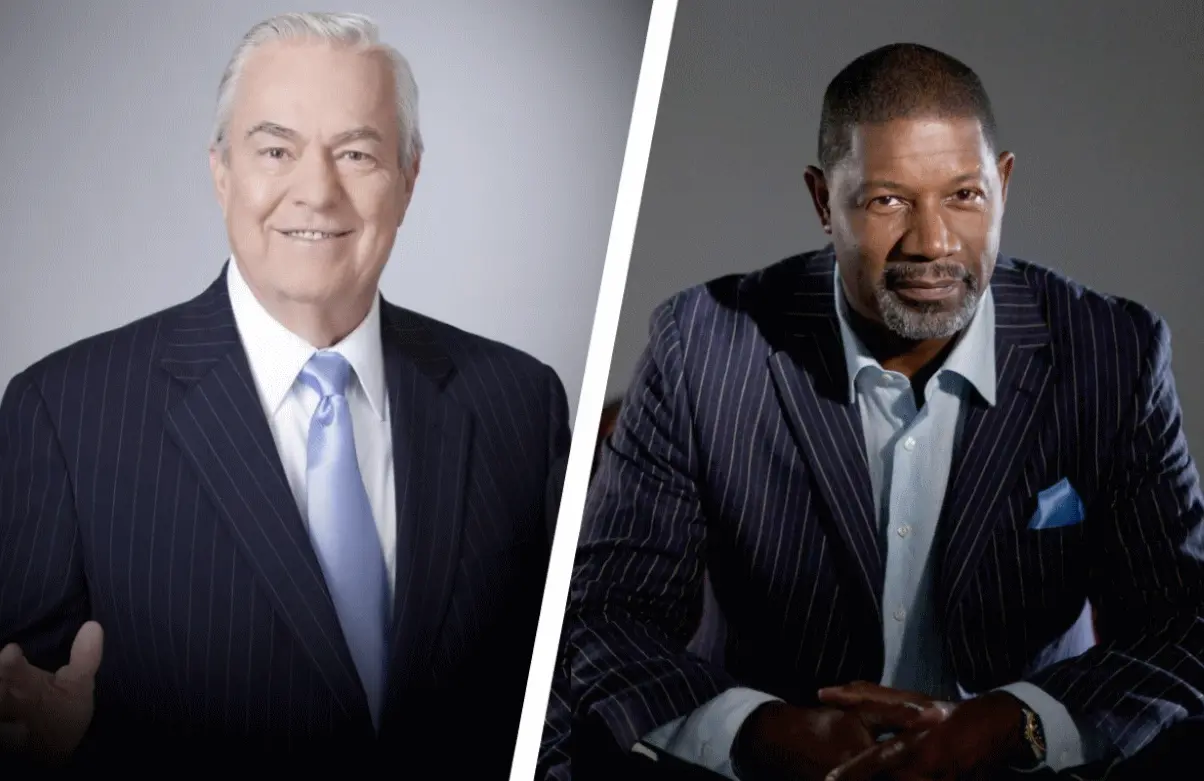True Crime Dinosaurs Cold Case Files and American Justice Are Back, and They Aren't Half Bad
-
 Icons old (Bill Kurtis) and newer (Dennis Haysbert) host A&E's two new true-crime revivals.
Icons old (Bill Kurtis) and newer (Dennis Haysbert) host A&E's two new true-crime revivals.The editor-in-chief of the daily newsletter Best Evidence, Sarah D. Bunting knows a thing or two about true crime. Her weekly column here on Primetimer is dedicated to all things true-crime TV.
Return with me now to those days before streaming services and DVRs, when TV's true-crime menu was relatively short. We had the famous original Unsolved Mysteries; we had the primetime newsmags like 20/20 and 48 Hours; we had the occasional Lifetime movie or sweeps-period miniseries; and we had A&E's somber, soothing selection of shows. Cold Case Files and American Justice (and, to an extent, City Confidential, although that one felt more lurid) were what passed for "prestige" true-crime programming at the turn of the millennium, introducing many a rainy-Sunday channel-surfer to the "documentary justice" genre and to the headline cases that fuel its engine. True crime has evolved over the last two or three decades, but for a lot of us, A&E's case overviews — and the plummy voice-overs by veteran journo Bill Kurtis, who took his narration seriously and himself not very — were formative to our interest in the subject.
But is there still a place for the meticulous but predictable brand of true crime of times gone by? A&E is betting there is, bringing back both Cold Case Files and American Justice this week with new episodes and, in the case of American Justice, a new narrator (24's Dennis Haysbert). I can't speak for the segment of the audience that doesn't remember the originals, but to THIS reviewer, it looks like A&E bet correctly.
I've seen the premieres of the two new-and-improved shows and enjoyed them both, so let's start with Cold Case Files, for which Bill Kurtis is once again back in the voice-over chair. Kurtis's familiar baritone is the aural equivalent of a Proustian madeleine, both authoritative and confiding, and it's nice to reunite with it. The first episode's topic is smartly chosen; a Florida man (...of course) disappears during a solo hunting trip, and while authorities insist that he was eaten by alligators, there's actually a love triangle in play. It's well paced, too: interviewees give process-y insight into what findings mean, and there's little draggy B-roll or extraneous summarizing at the act breaks. That's partly down to a slimmer runtime than the show would have had 20 years ago — this is true across TV genres, actually, but when I watch a 47-minute episode from back in the day, I find almost all of the extra 5-6 minutes is trimmable fat — but I suspect producers understand just how many programming choices the audience has compared to 20 years ago, too, and know they have to keep things moving.
American Justice's premiere is just as solid. Haysbert is the perfect choice to step in as host; like Kurtis, he projects an avuncular confidence as he takes us through the disappearance of Sarah Stern and the difficulties her case presented for police and prosecutors. Like the Cold Case Files opener, American Justice has selected a compelling story — but it's not TOO chilling or gory. This is where both of these shows shine, by... well, not shining, exactly. The subject matter can absorb you, but you can also play a game on your phone while you're watching. The perpetrators are evil or pathetic enough to hold our interest, but not so monstrous that we'll have nightmares about them. It's competent, well-researched, informative television that lets us pay as much or as little attention as we want, perfect for marathoning on a lazy weekend, or turning off in the middle to go make lunch.
Not to damn CCF and American Justice with faint praise here, but I think there's still a place for perfectly fine true-crime shows, ones that don't go overboard with genre clichés but don't strain to avoid them either. There's something to be said for a documentary-justice series knowing what it's good at, and doing those things, particularly in a reboot-heavy landscape that's seeing a lot of revivals trying to "fix" elements of the original that weren't necessarily broken. Cold Case Files and American Justice could re-center their storytelling away from cops and officers of the court a little more, I suppose, and I hope going forward that both shows choose cases that aren't quite as white as the ones they opened with; it's not like there aren't any adjustments that would make these old standbys more relevant.
But at the same time, that old-standby status is probably their chief selling point. They're not perfect hours of TV, but it's nice to have them back.
Cold Case Files premieres on A&E Friday August 20 at 9:00 PM ET, followed by American Justice at 10:00 PM ET.
Sarah D. Bunting co-founded Television Without Pity, and her work has appeared in Glamour and New York, and on MSNBC, NPR's Monkey See blog, MLB.com, and Yahoo!. Find her at her true-crime newsletter, Best Evidence, and on TV podcasts Extra Hot Great and Again With This.
TOPICS: Cold Case Files, A&E, American Justice, Bill Kurtis, Dennis Haysbert, True Crime